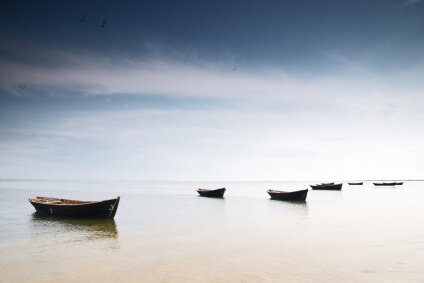If Grief is a River Then Faith is a Boat

My mother and father died within thirteen months of each other. And they weren’t even married. I got a double crash course in dying, in grieving, and in faith.
Mom was at home under hospice care. Dad was in the hospice unit of the hospital. I was honored and ultimately deeply blessed to be present at the moments both Mom and Dad departed earth in the quiet early morning hours. The preceding final days, two in my father’s case, four in my mom’s, were intense, sad, and full of wonder as the family found its own rhythms of coming and going, talking and silence, laughing and crying, keeping vigil at their bedsides. They were trying but extraordinarily special and unforgettable times. Each was an important part of our family’s grieving process.
Illness, death and grief can test our faith. What’s surprised me about the loss of both of my parents, is that their deaths have strengthened my faith. Which in turn has softened my grief, and made it more… navigable.
For me, grief is a river. Some days the river runs wild, filled with white water rapids and sudden rocky outcroppings. Over time, it flows along more gently, if deeper. I’ll tell you one thing, though, it’s a long son-of-a-gun.
To indulge me with this metaphor a little longer, my faith is a boat. Not a large fancy yacht. More like the dinghy my dad liked to row in on summer mornings. Plenty of room for one person, but it could be leaky. Paddling is hard work.
We turn to religion and to our faith for answers in times of loss, if not before. We can be guilty of ignoring or putting off those big basic questions under more “normal” circumstances. Did Mom cease to exist? Where did Dad go? What did their lives mean?
All religions attempt to reassure us on this front. Jesus was pretty adamant that what we experience with our five senses is not all there is (although he didn’t put it quite like that). And that God who created us and our world awaits us.
Mom was a woman of deep and wide faith-although she was always searching, questioning, pondering, and poking holes in her own boat (fortunately, it had a ninety-horsepower outboard). She was not afraid of death. She only allowed as how she wished she had a little more time with us.
My father was not a religious man, but he worshiped God in the sky as a pilot and on the ocean as a sailor. He also liked to be in control, and he fought death in hand-to-hand combat for nine months of serious illness, and another twenty some odd years before that, battling leukemia. That is, until about forty-eight hours before he died. Observing the extraordinary smile on my father’s unconscious face hours before he drew his last breath, as if he were seeing something miraculously beautiful, or someone he loved very much after a long absence, filled me with joy, awe and sadness. That he, a man always very much in control, was finally, lovingly convinced somehow to give up control, speaks of a powerfully persuasive argument. Or Arguer.
The moment a loved one leaves this world is a sacred moment, difficult to describe in its power and awesomeness. Being present at a birth (let alone giving birth) for me was a similar experience. My folks were both ready to go when they died, after time spent getting ready, and hearing all of our family tell them that we would be fine, that we loved them, and that it was okay to go. Their peacefulness let me know that they did not fear—in fact welcomed, what they were going to.
This was majorly reassuring.
But they still left me behind.
To navigate this river of grief, the trick has been going with the current. So it’s really not navigating, since the first order is to accept that there is only one direction and destination and going with the flow is way easier than trying to paddle up stream.
I get that I’m not in control. I’m truly thankful I have a boat, and am not dog-paddling.
I believe that my folks went to something beautiful, loving and wonderful. And that we will be reunited when my turn comes. We humans have created myths and stories and entire religions to explain death since time began. All prophets, not just Jesus, have tried to convince us of a life after death, as well as of our duties while we’re here.
Still, nothing beats first hand experience.
Perhaps existence beyond our present physical one is truly incomprehensible for those of us left on Earth, other than with metaphors. But thanks to my parents’ passings, I believe more than ever that a realm, a heavenly kingdom exists. Into which we are welcomed with open, loving, forgiving arms, regardless of what we’ve done or believed.
That’s the incredibly good news. And how can I grieve about that? I miss my folks every day, but my new reinforced dinghy, with the small trolling motor, is making good time downstream and I’m hoping we’re headed for the sea of tranquility.
